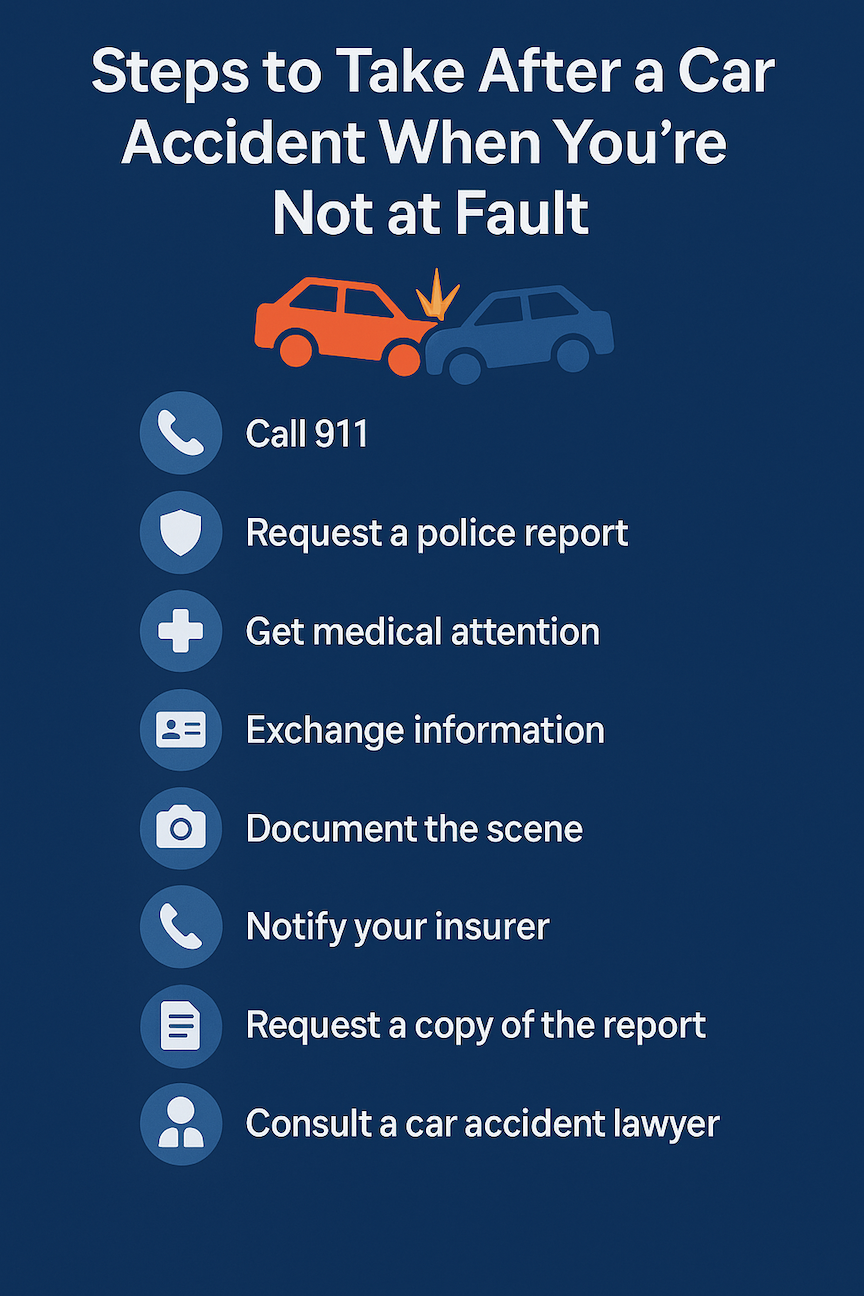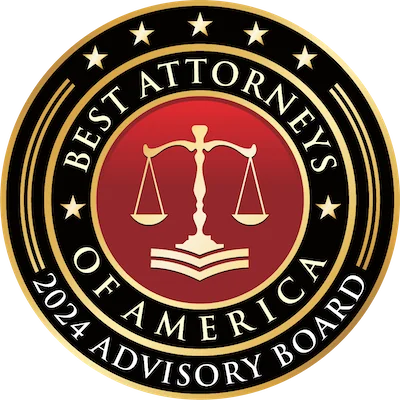Car accidents are stressful, painful, and disruptive… even more so when you’re left dealing with injuries that weren’t your fault. Many people assume that if the other driver caused the crash, things will go smoothly. But that’s rarely how it works.
Insurance companies don’t automatically accept liability. Medical bills can stack up before compensation arrives. And Florida’s updated negligence laws mean that even if you’re only partially blamed, your right to recover damages could be at risk.
Knowing what to do after a car accident when you’re not at fault in Florida can protect your health, your finances, and your legal options.
1. Call 911 and Stay at the Scene
Even if it looks like a minor fender bender, always call the police and wait for officers to arrive. Florida law requires you to report accidents involving injuries or significant property damage, and the police report can be critical for proving fault later.
When the police arrive:
- Stick to the facts. Do not speculate or admit fault.
- Let the officer know if the other driver appeared distracted, aggressive, or impaired.
- Ask how and when you can get a copy of the report.
If law enforcement doesn’t respond (which sometimes happens in minor collisions), you may be required to file a report yourself with the Florida Highway Safety and Motor Vehicles department.
2. Document Everything at the Scene
The more evidence you gather, the harder it will be for the other driver or their insurer to dispute what happened.
Use your phone to take:
- Photos of both vehicles from multiple angles
- Close-ups of visible damage, debris, skid marks, or traffic signs
- Pictures of the entire intersection or road layout
- Any visible injuries you or your passengers sustained
Also:
- Get the names and contact details of witnesses
- Exchange insurance and driver’s license information with the other party
- Make notes while your memory is fresh, as even small details like weather, time of day, or traffic signals could matter later
3. Get Medical Attention Promptly
Even if you feel okay, don’t delay care. Many accident-related injuries, such as whiplash, back injuries, internal bleeding, or concussions, may not show symptoms immediately.
Under Florida’s Personal Injury Protection (PIP) rules, you only have 14 days to seek medical treatment if you want those benefits to apply. PIP will cover up to 80% of medical bills and 60% of lost wages, regardless of who caused the crash.
Early treatment also strengthens your legal claim:
- It creates a documented link between your injuries and the crash
- It helps prove that your pain, limitations, or recovery needs are legitimate
- It prevents insurers from arguing that your injuries are exaggerated or unrelated
4. Notify Your Insurance Company, Carefully
Even though the crash wasn’t your fault, you still need to notify your insurer promptly. Your PIP coverage will kick in automatically, and failure to report the incident could jeopardize your benefits.
Keep the conversation limited and factual:
- Avoid speculating about fault
- Decline to give a recorded statement until you’ve spoken with a lawyer
- Do not minimize your injuries, even if you’re trying to sound calm or reasonable
5. Watch Out for the Other Driver’s Insurer
In a perfect world, the at-fault driver’s insurance company would accept liability and offer you fair compensation. In reality, they may look for ways to:
- Suggest that you were partially or mostly responsible
- Downplay the seriousness of your injuries
- Offer a fast settlement before the full impact of the crash is known
This is where Florida’s comparative negligence law comes in. Since 2023, Florida has followed a modified comparative fault rule:
If you’re found more than 50% at fault, you can’t recover any damages at all.
This gives insurance companies a strong incentive to assign blame to you, even in cases that seem straightforward.
6. Don’t Count on the Other Driver to Cooperate
Even when the other driver admits fault at the scene, things often change once insurance is involved. It’s not uncommon for them to:
- Claim they had the green light (especially in intersection crashes)
- Say they didn’t see you or that you were speeding
- Blame a mechanical issue, road hazard, or weather condition
Without witnesses or dashcam footage, it can quickly become your word against theirs. That’s why your early documentation and eventual legal support are so important.
7. Contact a Personal Injury Attorney Sooner Rather Than Later
You don’t need a lawyer for every fender bender. But if you’ve been injured, fault is disputed, or compensation isn’t clear, legal help can make a dramatic difference.
A car accident attorney can:
- Investigate your crash and preserve critical evidence (before it’s lost or overwritten)
- Secure intersection camera footage, traffic data, and witness statements
- Review medical records and calculate your total damages
- Communicate with both insurance companies so you don’t have to
- Push back against unfair settlement offers or blame-shifting
Even if liability seems obvious, it often takes legal pressure to get full and fair compensation.
8. Common Mistakes People Make, Even When They’re Not at Fault
- Waiting too long to seek medical care
- Assuming the police report will be enough to prove fault
- Letting the other driver’s insurer guide the conversation
- Accepting a low settlement just to move on
- Posting about the crash on social media (which insurers can monitor)
What to Remember Moving Forward
Knowing what to do after a car accident when you’re not at fault in Florida puts you in control of the process. While you can’t undo the accident, you can protect your recovery, minimize financial fallout, and ensure you’re treated fairly by the system.
Talk to Silver Injury Law
At Silver Injury Law, we represent people who were doing everything right until someone else caused harm. We understand what you’re going through, and we know how to help. If you’ve been injured in a crash that wasn’t your fault, contact us for a free consultation. We’ll explain your options, protect your rights, and handle the legal details so you can focus on healing.




